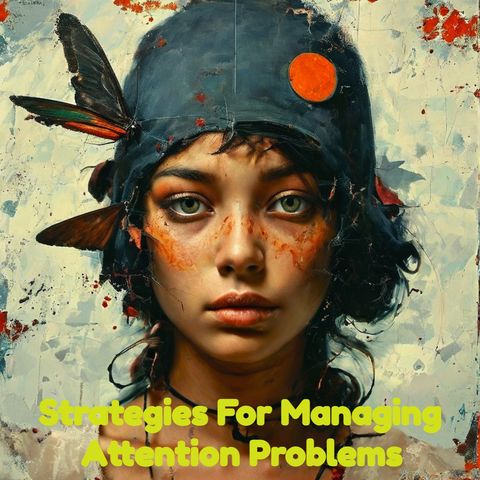
Contacts
Info
Understanding and Managing Attention Problems in Children Attention problems can significantly impact a child’s ability to learn, interact, and succeed in various aspects of life. Whether it’s struggling to concentrate...
show moreAttention problems can significantly impact a child’s ability to learn, interact, and succeed in various aspects of life. Whether it’s struggling to concentrate in class, forgetting instructions, or being easily distracted, these challenges can affect academic performance and social development.
However, with proper understanding and effective strategies, parents and educators can help children manage attention issues more successfully.
Identifying Attention Problems: Recognizing attention problems early is crucial.
Common signs include difficulty focusing on tasks, impulsiveness, forgetfulness, and frequent daydreaming.
Children may struggle to follow instructions or complete assignments, leading to frustration and anxiety.
Causes of Attention Issues: Attention problems can stem from various factors:
- Neurological Factors: Differences in brain development and neurotransmitter levels can impact attention.
- Genetics: Attention disorders often run in families, suggesting a genetic component.
- Environment: Chaotic or overly stimulating environments can exacerbate attention difficulties.
- Learning Disabilities: Conditions like ADHD (Attention Deficit Hyperactivity Disorder) can contribute to attention challenges.
- Structured Routines: Establishing consistent daily schedules can help children stay organized and focused.
- Clear Instructions: Break tasks into manageable steps and provide clear, concise instructions.
- Minimize Distractions: Create a quiet, clutter-free workspace to aid concentration.
- Positive Reinforcement: Acknowledge and reward small achievements to boost motivation.
- Healthy Lifestyle: Encourage regular exercise, adequate sleep, and balanced nutrition to support overall brain health.
Developing personalized education plans (IEPs or 504 plans) can ensure children receive necessary accommodations and support in educational settings.Seeking
Professional Guidance: Consulting with pediatricians, psychologists, or behavioral therapists can provide tailored strategies and interventions.
Behavioral therapy, cognitive training, or medication (in severe cases) may be recommended based on individual needs.
Empowering Children: Teach children self-awareness and coping skills.
Encourage them to use tools like timers, checklists, and visual aids to enhance focus and organization.
By adopting a comprehensive approach that combines understanding, support, and effective strategies, we can empower children with attention problems to thrive academically and socially.

Find Out How Managing Attention Problems
Find Out How Managing Attention Problems
Understanding and Managing Attention Problems in Children Attention problems can significantly impact a child’s ability to learn, interact, and succeed in various aspects of life. Whether it’s struggling to concentrate...
show moreAttention problems can significantly impact a child’s ability to learn, interact, and succeed in various aspects of life. Whether it’s struggling to concentrate in class, forgetting instructions, or being easily distracted, these challenges can affect academic performance and social development.
However, with proper understanding and effective strategies, parents and educators can help children manage attention issues more successfully.
Identifying Attention Problems: Recognizing attention problems early is crucial.
Common signs include difficulty focusing on tasks, impulsiveness, forgetfulness, and frequent daydreaming.
Children may struggle to follow instructions or complete assignments, leading to frustration and anxiety.
Causes of Attention Issues: Attention problems can stem from various factors:
- Neurological Factors: Differences in brain development and neurotransmitter levels can impact attention.
- Genetics: Attention disorders often run in families, suggesting a genetic component.
- Environment: Chaotic or overly stimulating environments can exacerbate attention difficulties.
- Learning Disabilities: Conditions like ADHD (Attention Deficit Hyperactivity Disorder) can contribute to attention challenges.
- Structured Routines: Establishing consistent daily schedules can help children stay organized and focused.
- Clear Instructions: Break tasks into manageable steps and provide clear, concise instructions.
- Minimize Distractions: Create a quiet, clutter-free workspace to aid concentration.
- Positive Reinforcement: Acknowledge and reward small achievements to boost motivation.
- Healthy Lifestyle: Encourage regular exercise, adequate sleep, and balanced nutrition to support overall brain health.
Developing personalized education plans (IEPs or 504 plans) can ensure children receive necessary accommodations and support in educational settings.Seeking
Professional Guidance: Consulting with pediatricians, psychologists, or behavioral therapists can provide tailored strategies and interventions.
Behavioral therapy, cognitive training, or medication (in severe cases) may be recommended based on individual needs.
Empowering Children: Teach children self-awareness and coping skills.
Encourage them to use tools like timers, checklists, and visual aids to enhance focus and organization.
By adopting a comprehensive approach that combines understanding, support, and effective strategies, we can empower children with attention problems to thrive academically and socially.
Information
| Author | Find Out How! |
| Organization | Find Out How! |
| Categories | Education , Mental Health , Health & Fitness |
| Website | - |
| apacktosend@hotmail.com |
Copyright 2024 - Spreaker Inc. an iHeartMedia Company
